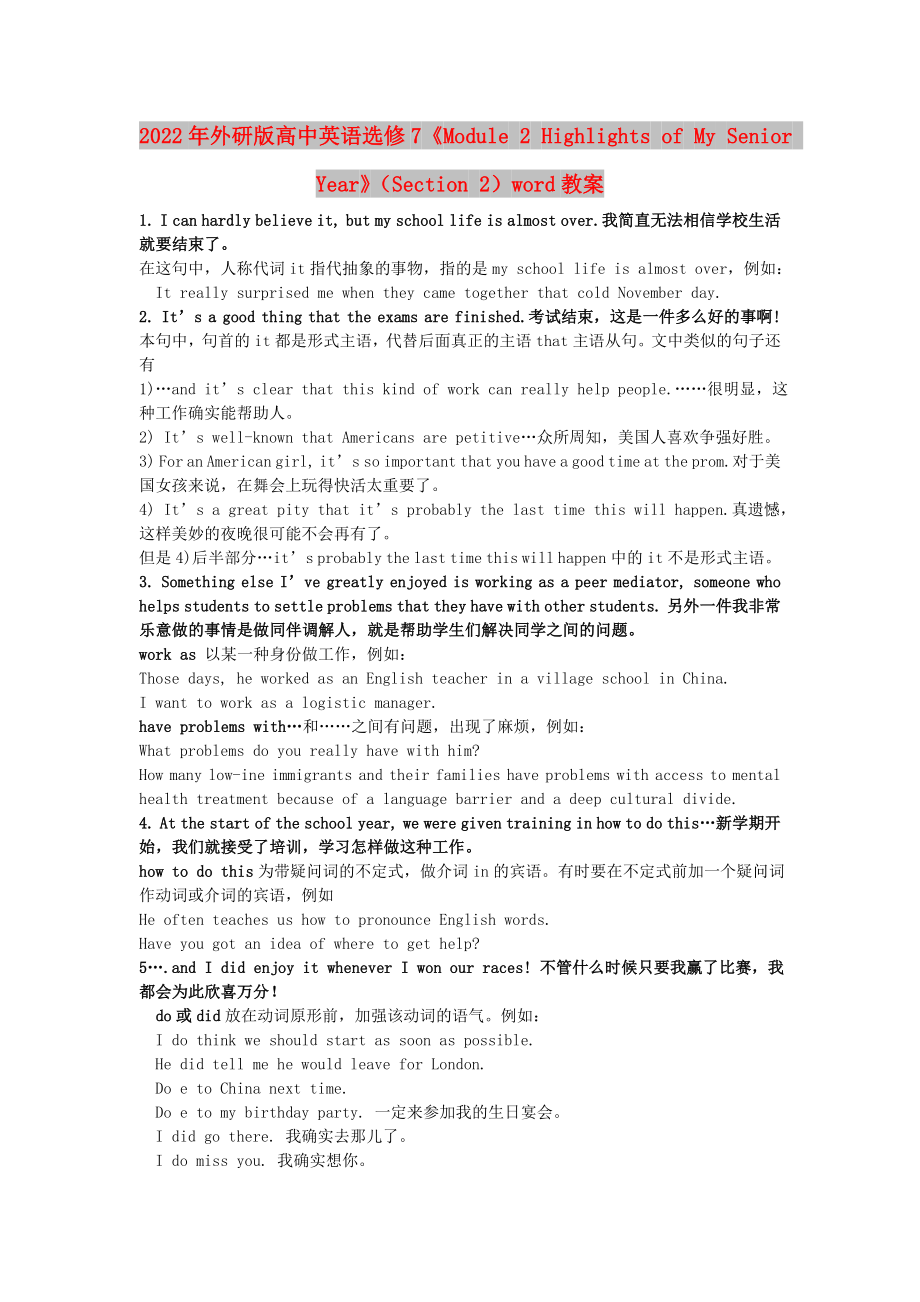《2022年外研版高中英語選修7《Module 2 Highlights of My Senior Year》(Section 2)word教案》由會員分享���,可在線閱讀����,更多相關(guān)《2022年外研版高中英語選修7《Module 2 Highlights of My Senior Year》(Section 2)word教案(3頁珍藏版)》請在裝配圖網(wǎng)上搜索���。
1�����、2022年外研版高中英語選修7《Module 2 Highlights of My Senior Year》(Section 2)word教案
1. I can hardly believe it, but my school life is almost over.我簡直無法相信學(xué)校生活就要結(jié)束了����。
在這句中,人稱代詞it指代抽象的事物���,指的是my school life is almost over����,例如:
It really surprised me when they came together that cold November day.
2. It’s a good
2���、thing that the exams are finished.考試結(jié)束��,這是一件多么好的事啊!
本句中����,句首的it都是形式主語���,代替后面真正的主語that主語從句��。文中類似的句子還有
1)…and it’s clear that this kind of work can really help people.……很明顯��,這種工作確實能幫助人��。
2) It’s well-known that Americans are petitive…眾所周知����,美國人喜歡爭強好勝。
3) For an American girl, it’s so important that you have
3�、 a good time at the prom.對于美國女孩來說,在舞會上玩得快活太重要了����。
4) It’s a great pity that it’s probably the last time this will happen.真遺憾���,這樣美妙的夜晚很可能不會再有了�。
但是4)后半部分…it’s probably the last time this will happen中的it不是形式主語����。
3. Something else I’ve greatly enjoyed is working as a peer mediator, someone who helps stu
4、dents to settle problems that they have with other students. 另外一件我非常樂意做的事情是做同伴調(diào)解人�����,就是幫助學(xué)生們解決同學(xué)之間的問題。
work as 以某一種身份做工作���,例如:
Those days, he worked as an English teacher in a village school in China.
<
5、really have with him?
How many low-ine immigrants and their families have problems with access to mental health treatment because of a language barrier and a deep cultural divide.
4. At the start of the school year, we were given training in how to do this…新學(xué)期開始���,我們就接受了培訓(xùn)�����,學(xué)習(xí)怎樣做這種工作����。
how to do this
6���、為帶疑問詞的不定式�����,做介詞in的賓語�����。有時要在不定式前加一個疑問詞作動詞或介詞的賓語�����,例如
He often teaches us how to pronounce English words.
Have you got an idea of where to get help?
5….and I did enjoy it whenever I won our races! 不管什么時候只要我贏了比賽�,我都會為此欣喜萬分!
do或did放在動詞原形前����,加強該動詞的語氣。例如:
I do think we should start as soon as possible.
H
7����、e did tell me he would leave for London.
Do e to China next time.
Do e to my birthday party. 一定來參加我的生日宴會����。
I did go there. 我確實去那兒了。
I do miss you. 我確實想你�。
句中的it是人稱代詞,代表抽象的事物�����,指的是whenever I won our races。
whenever引導(dǎo)時間狀語從句���,意思為every or any time��,例如:
You may use my dictionary whenever you w
8����、ant to.
He was always in his lab whenever I went to see him.
6. It took two hours but it was worth it, as everyone told me I looked very elegant! 這花了我兩小時�����,不過很值得����,因為每個人都說我看起來端莊典雅。
在it took two hours but it was worth it.這句中
第一個“it”指的是“做頭發(fā)這件事” -- to have my hair done
第二個“it”指的也是“做頭發(fā)這件事” --to have
9�、 my hair done
第三個“it”指的是“兩小時的時間” --the time of two hours, 在這里,可理解為:worth it=worthwhile在上下文意思明確時����,我們可以說worth it,表示一個很好的理由去做某事��、值得去做某事。這里的it代表什么�����,可以通過上下文去理解�,例如:
It was hard work, but it was worth it in the end.
The dictionary costs 80 yuan, which is worth it for learning English.
7. For some student
10、s and their parents, high school sport is considered more important than academic achievements.一些學(xué)生和家長把中學(xué)里的運動看得比學(xué)習(xí)成績還要重要���。
consider大致有兩種含義�����。含義不同��,用法有別?��,F(xiàn)歸納如下。
1) consider作“考慮”解�����,常用于以下句型:
All things considered全面地考慮�,在句中作狀語��,用于概括或總結(jié)。
a. consider+名詞/代詞/動名詞�。
You’d better consider my suggestion. 你最好考慮我的建議。
11���、
I’m considering going abroad some day.我一直考慮有一天出國�����。
I will consider your offer and tell you my decision tomorrow. 對于你的提議我要考慮一下��,明天告訴你我的決定���。
b. consider+從句或“疑問詞+不定式”。
Have you considered what he suggested? 你們考慮他的建議了嗎����?
We must consider what to do next.我們必須考慮下一步要做什么。
All things considered, our old c
12����、ar is no good, so we should buy a new one now.總的來說,我們的舊車已經(jīng)沒有用了�����,所以我們現(xiàn)在應(yīng)該買輛新的。
Considering how sick he is, he should go to the doctor.鑒于他病得那樣厲害�,他應(yīng)去看醫(yī)生。
2) consider作“認(rèn)為”解時�,常用于以下句型:
a. consider sb./sth+.(as)+形容詞/名詞。其中�,as可以省略。
We consider him honest.我們認(rèn)為他很誠實��。
At first they considered me as a doctor.
13�����、起初他們認(rèn)為我是醫(yī)生�����。
He was considered as a great leader. 他被認(rèn)為是一個偉大的領(lǐng)袖�。
b. consider+sb./sth.+不定式。其中�,不定式通常是to be(可以省略)或其他動詞的完成式。
We consider this matter to be very important.我們認(rèn)為這件事很重要�。
We all consider him to have stolen the bike.我們都認(rèn)為他偷了自行車。
He considers this to be one of the best books on the subject.他
14��、認(rèn)為這是關(guān)于這個課題最好的書之一�。
He is considered to have broken the window. 有人認(rèn)為是他弄壞了窗。
c. consider+it+形容詞/名詞+不定式短語���。
We all consider it important to learn English. 我們都認(rèn)為學(xué)好英語是重要的
We consider it hard to study English well.我們認(rèn)為學(xué)好英語很難�����。
I consider it my duty to help you with your studies.我認(rèn)為幫助你學(xué)習(xí)英語是我的職責(zé)�����。
d. cons
15���、ider+賓語從句。
We consider that the music is well worth listening to.我們這首音樂很值得一聽���。
8. They do this in order to encourage crowds to cheer their sports teams.他們這樣做來鼓勵觀眾為他們的運動隊加油��。
cheer 為……加油���;向……喝彩;歡呼
The crowd cheered when he appeared.當(dāng)他出現(xiàn)時����,人群發(fā)出歡呼聲���。
I went to cheer our team on.我去為我們的隊伍加油。
cheer感到振奮����,感到高興
The news cheered the family.那消息使那家人振奮不已。
He was cheered by the good news.他受到好消息的鼓舞���。
cheer up(使)感到振奮���;(使)感到高興
Your presence will cheer him up. 你的出場將使他振奮。
 2022年外研版高中英語選修7《Module 2 Highlights of My Senior Year》(Section 2)word教案
2022年外研版高中英語選修7《Module 2 Highlights of My Senior Year》(Section 2)word教案

